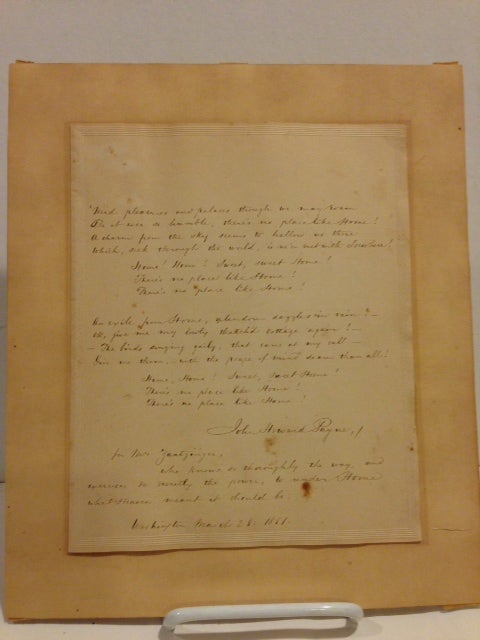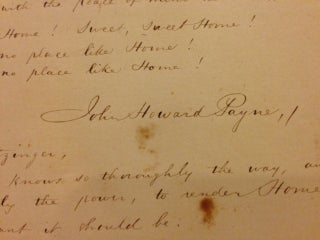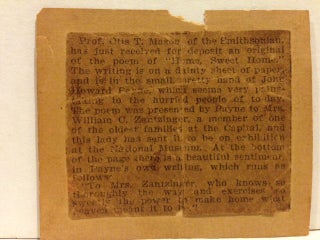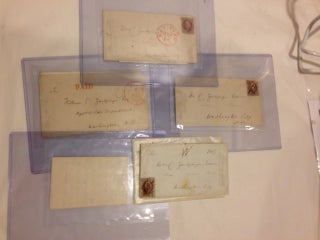"Home, Sweet Home," an original holograph copy of the poem and ballad, signed by the author and inscribed by him at the bottom to the wife of Daniel Webster's secretary "for Mrs. Zantzinger, who knows so thoroughly the way, and exercises so sweetly the power, to render Home what Heaven meant it should be. Washington, March 28, 1851."
Accompanied by five autograph letters from Payne to Zantzinger, signed 27 October 1849 – 4 May 1851. Washington, DC, 1851. The poem is written on a sheet of stationery, 8 x 6 1/2 inches embossed at the edges, and mounted on a larger sheet (9 x 8 3/4 inches); a small newspaper clipping accompanies the poem and notes that this particular copy was loaned by Mrs. Zantzinger to the Smithsonian Institution to be exhibited at the National Museum. The accompanying letters (12mo and 8vo, nine total pages, approximately 800 words) are all addressed to William C. Zantzinger (1818-1878); four of the letters are still enclosed in their mailing envelopes, three of which have canceled Benjamin Franklin five cent stamps, among the first general issue postage stamps available for use throughout the United States. The sheet on which the poem is written is age-toned; otherwise, a very good lot. (7189). Item #59184
John Howard Payne (born in New York City but reared in Boston) was an American actor, poet, author and diplomat. He is best remembered for composing "Home, Sweet Home." He was charming, temperamental and his lack of business acumen often left him in financial distress. Early success as an actor led him to try his talents on the London stage, though he found more work as a playwright. His composition "Home, Sweet Home," originally performed as part of a play that he wrote in England for Charles Kemble was wildly successful both in the United States and abroad, but he did not obtain economic stability from it. He returned relatively penniless to the United States in 1832, but the popularity of his song became his introduction into social circles where there were people willing to help him. One of his champions was Daniel Webster who successfully lobbied President Tyler to give him a post as the American consul to Tunis in 1842. With the election of President Polk in 1845, Payne was recalled (see DAB). The letters in this group all indicate his desire to regain his consular post, and emphasize his difficult financial situation. William Zantzinger, the recipient of Payne's letters, was Daniel Webster's personal secretary. In the first letter (dated New York, Oct. 27, 1849) Payne thanks Zantzinger for his “kind and effective activity in relation to my money.” He complains that his replacement in Tunis [Samuel Davies Heap] was “not content with clipping me out of the interest and indemnification, a new claim is trumped up to diminish my receipts, by a pretense that more rent [from his time in Tunis] remained unsettled than I had allowed for." The next letter (dated New York, Dec. 1, 1849) again discusses money problems. “It happens singularly enough that Mrs. Dyson’s is the only account upon which I have been dunned since I got my money. Everyone else has waited for me to move. I have paid away a very large portion of what I got, and shall only retain enough in hand to clear me through a new experiment of a few weeks in Washington.…" Two more from New York in early 1850 announce his plans to come to Washington to try to find work. By the final letter, dated New York, May 4, 1851, he has succeeded in getting his consul post back and notes “By the time this reaches you … I shall be off in the Humboldt for Havre." Payne died in Tunis in 1852, and was replaced by his nemesis Heap. Over thirty years later, philanthropist W.W. Corcoran paid to have his body returned to the United States. "Home, Sweet Home" continued to be a popular song long after Payne's death, and a favorite of soldiers during the Civil War. President Lincoln requested the Italian opera singer Adelina Patti perform it when she visited the White House in 1862.
Price: $12,500.00




